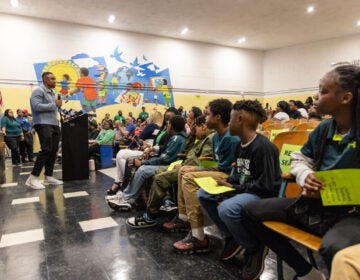Philly SRC approves five new charter schools, rejects 34, protesters arrested [photos]
Listen-
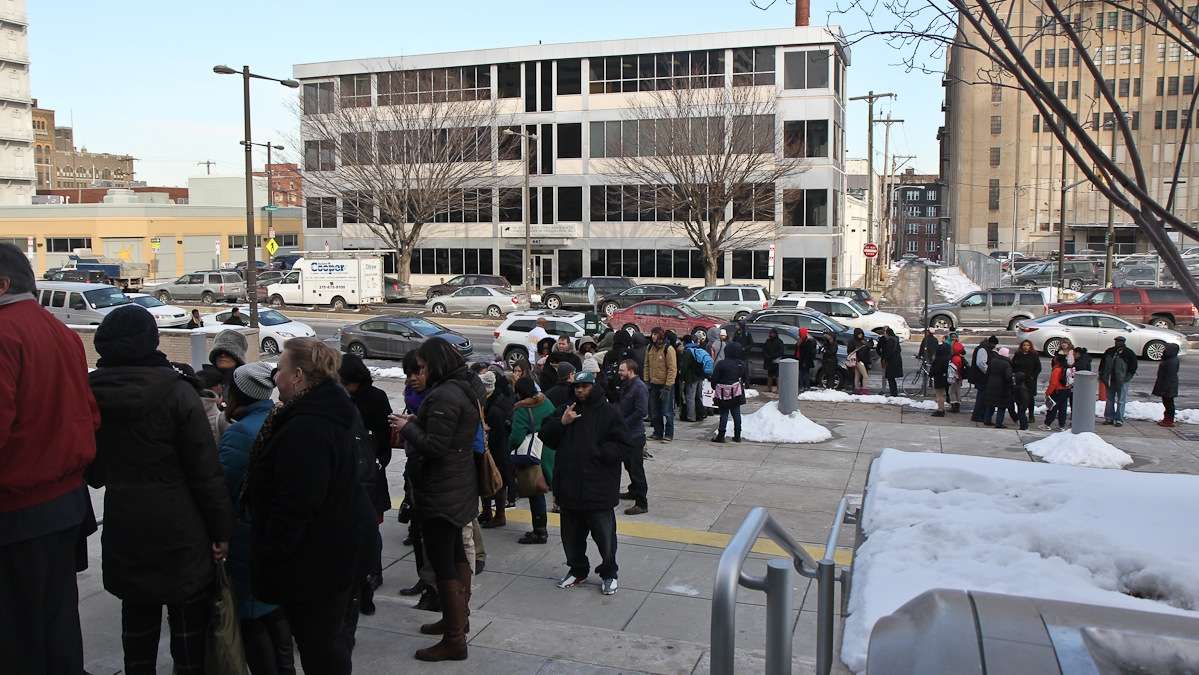
-

-
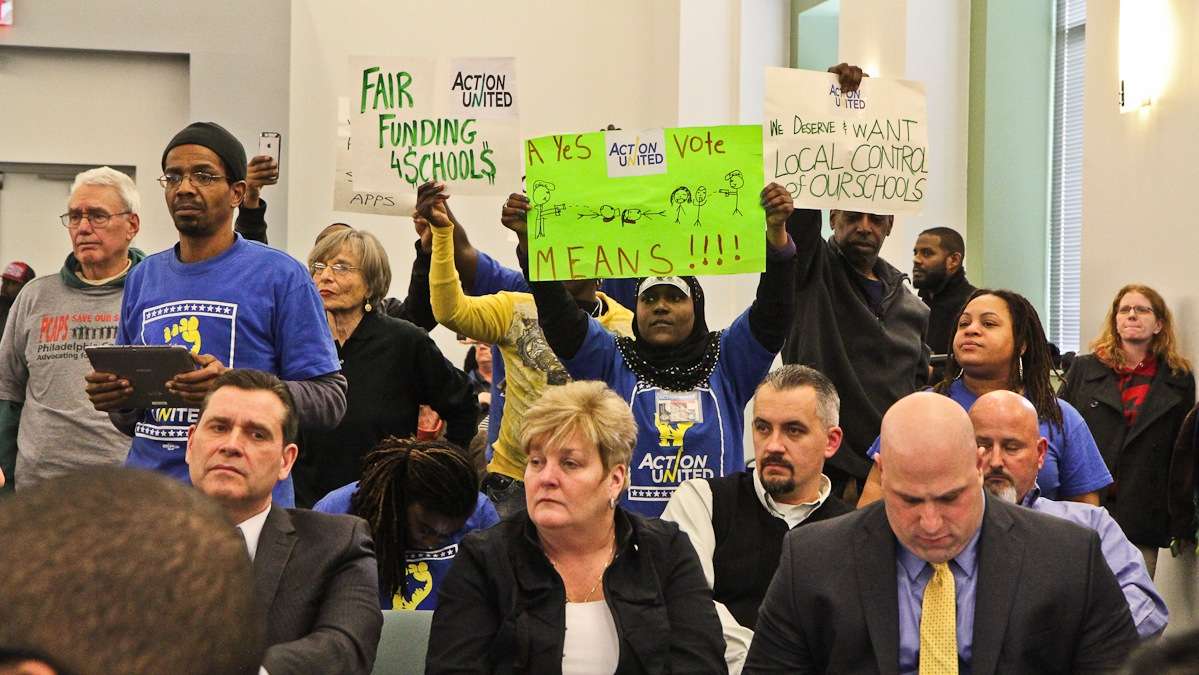
-

-
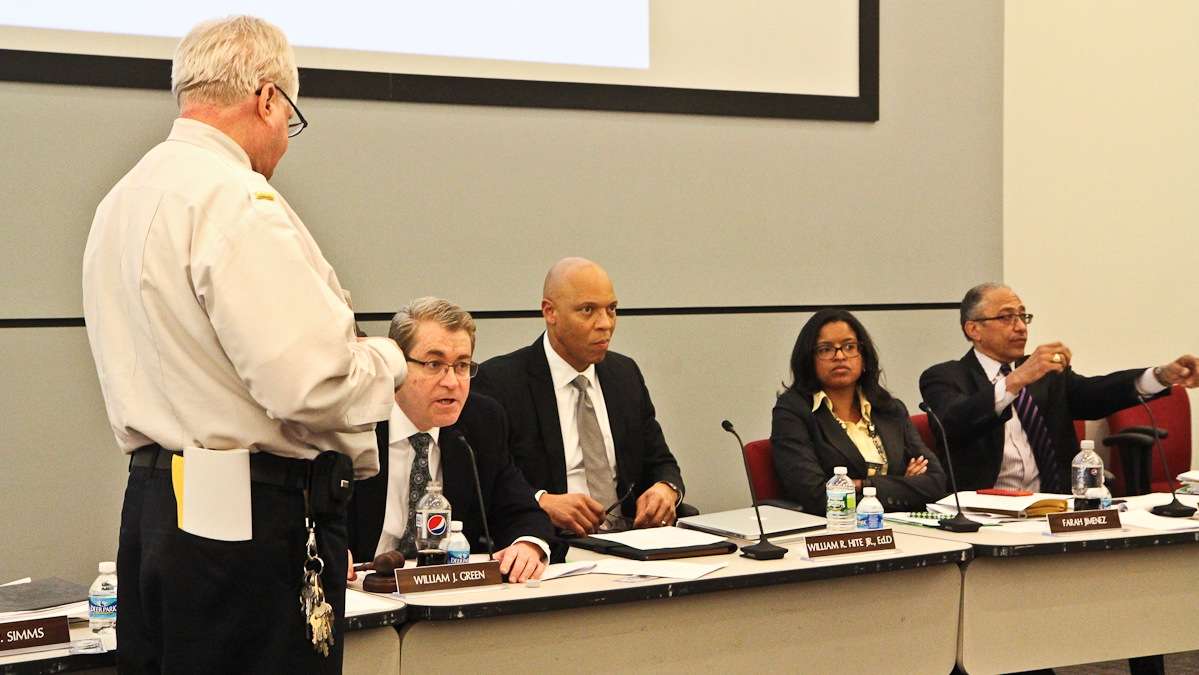
-
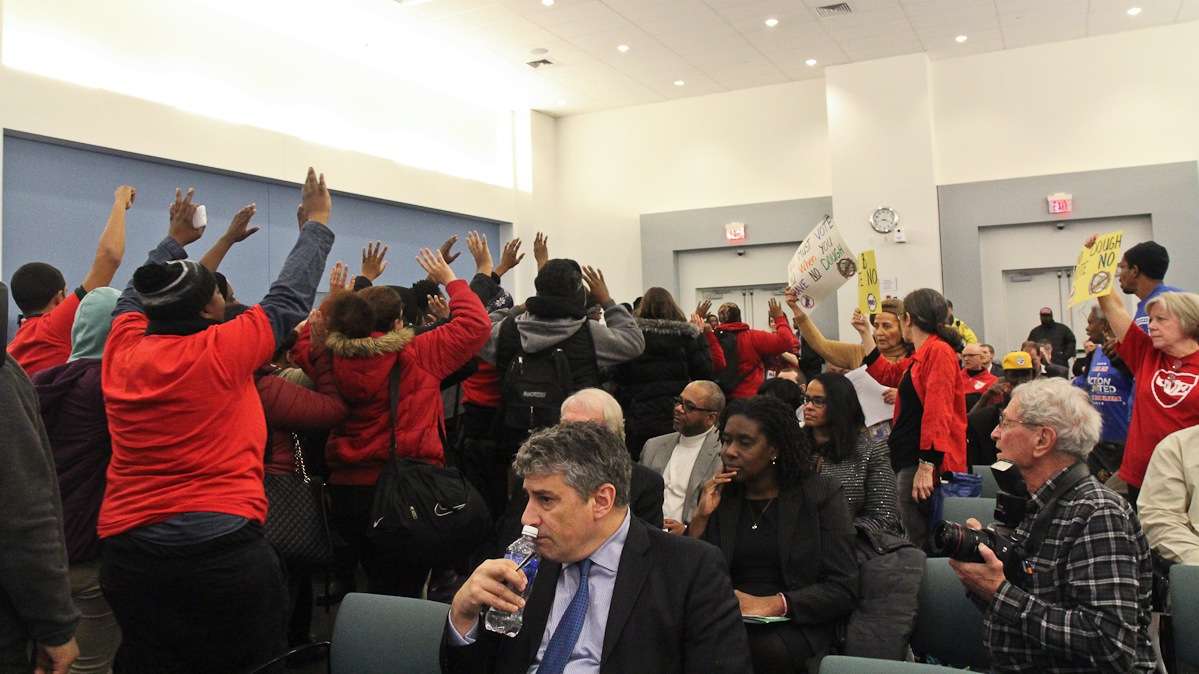
-
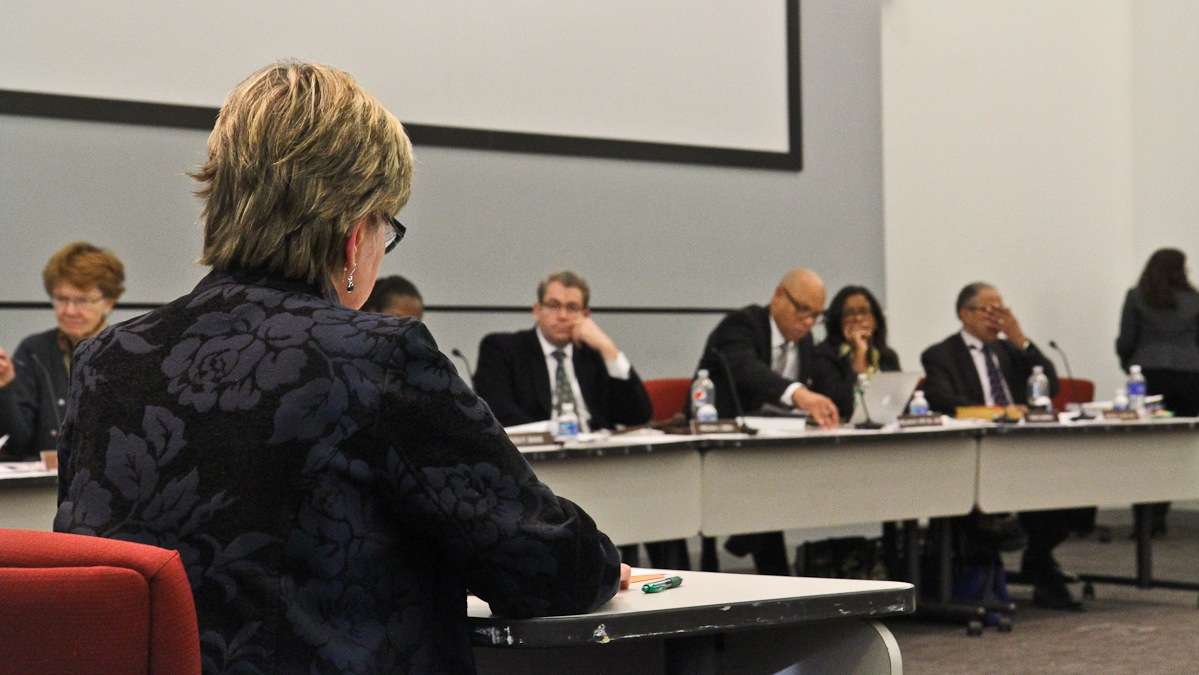
-
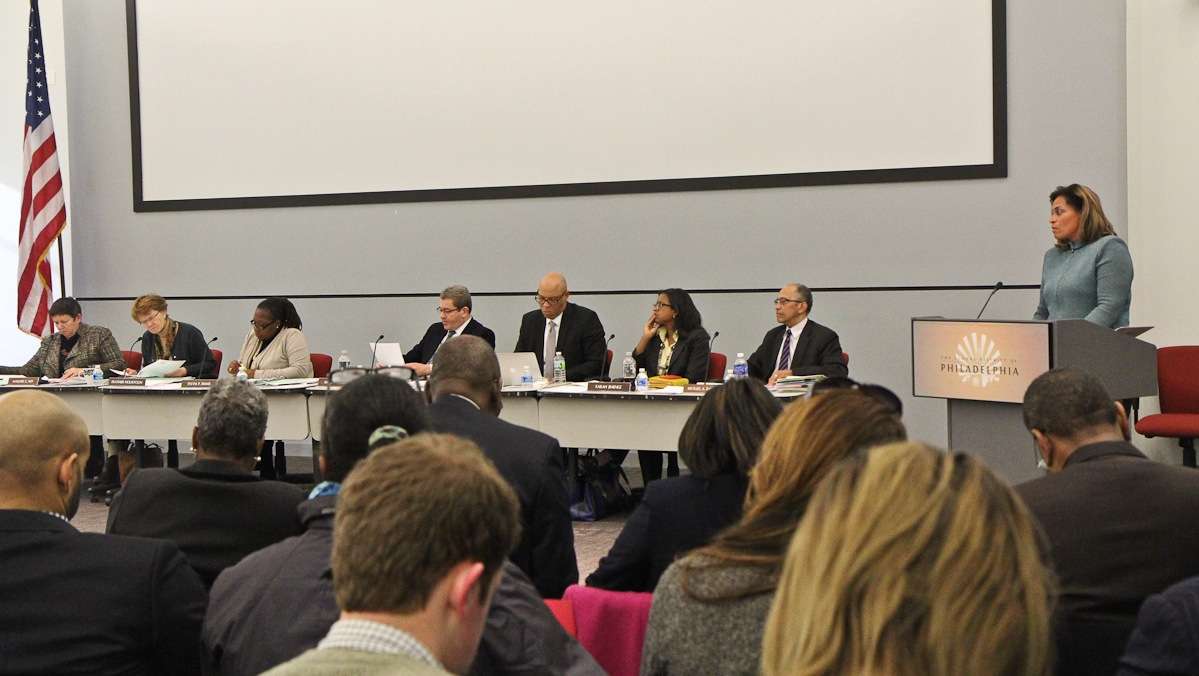
-
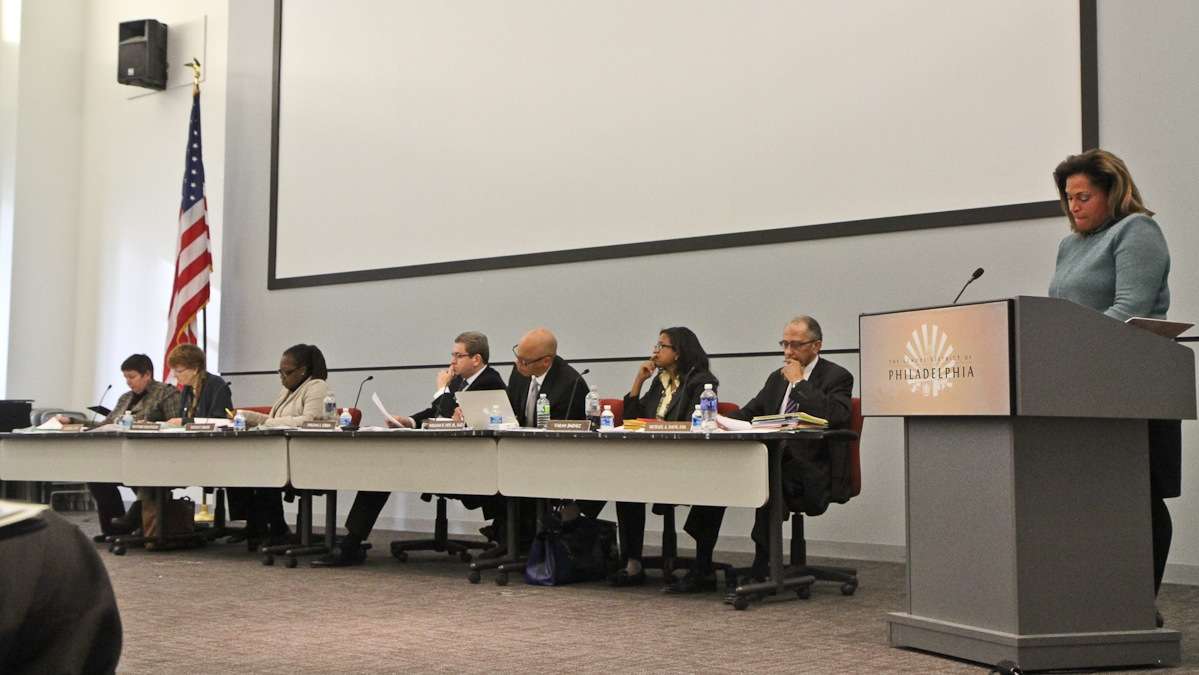
-

-
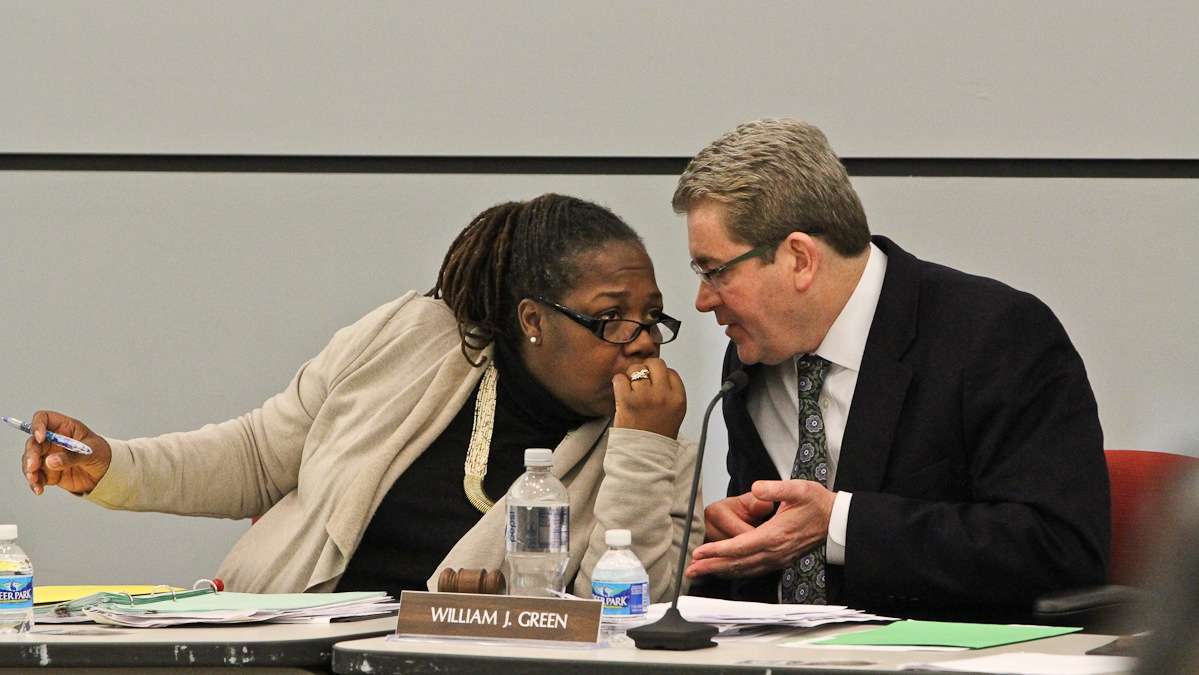
School Reform Commission members Sylvia Simms and Bill Green confer during hearings on charters school applications. Gov. Tom Wolf has said he's liked to dissolve the SRC, but not immediately.(NewsWorks file photo)
-
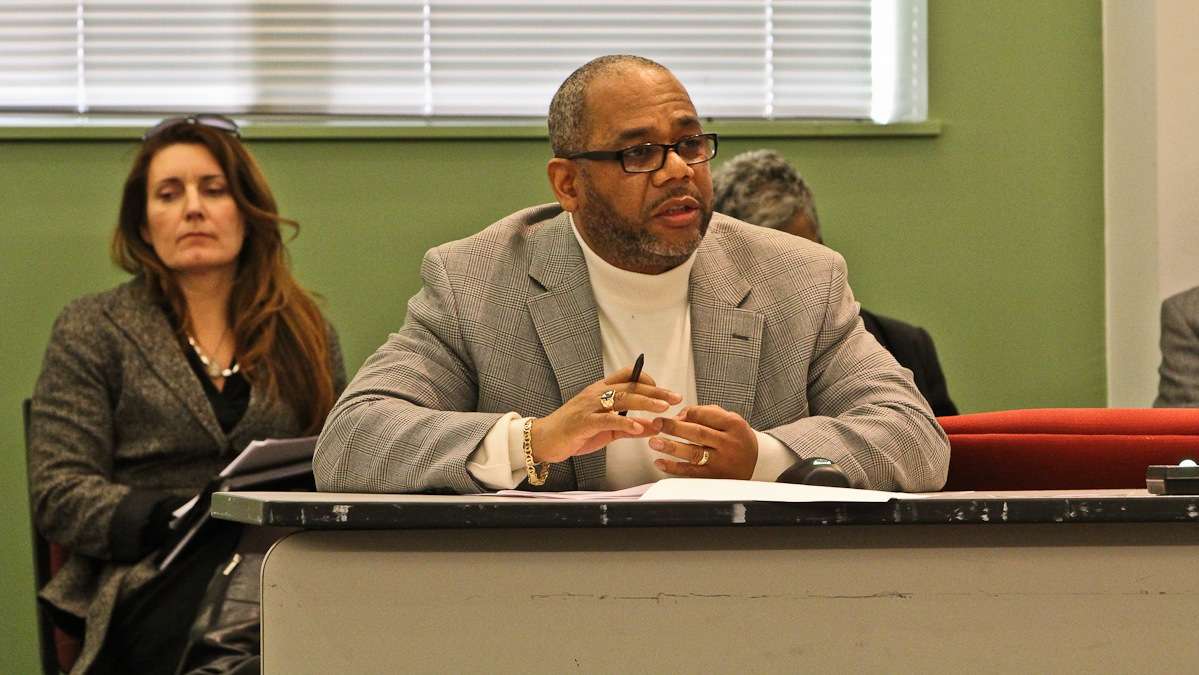
-
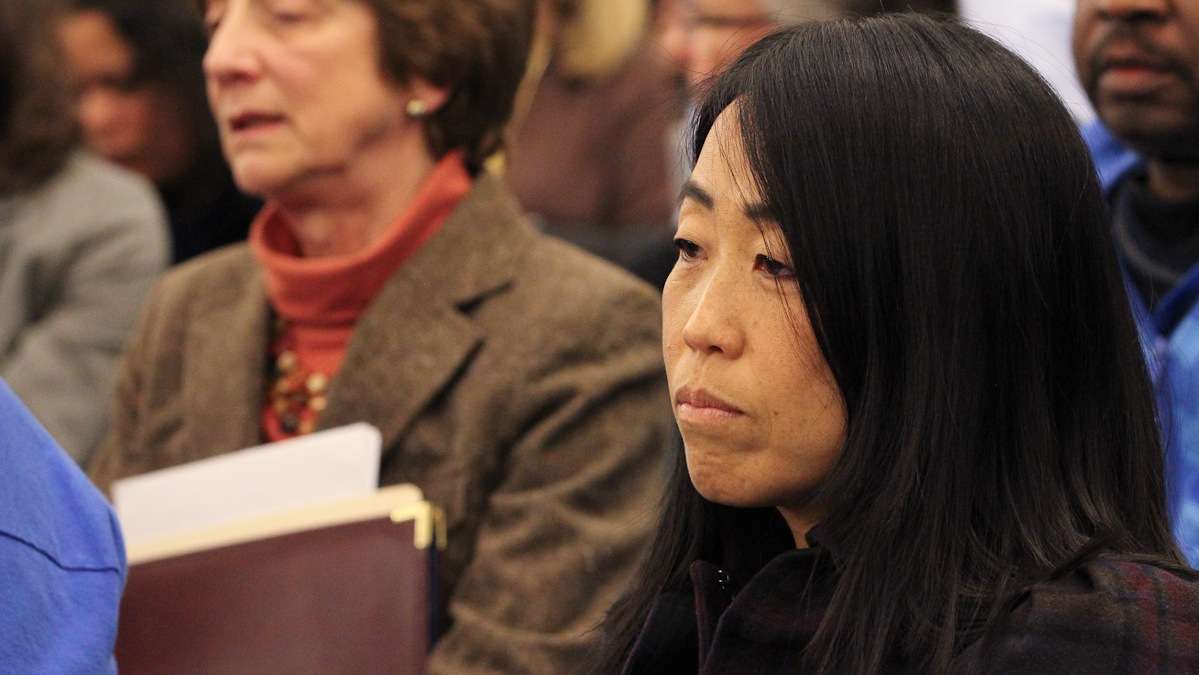
-

-

-
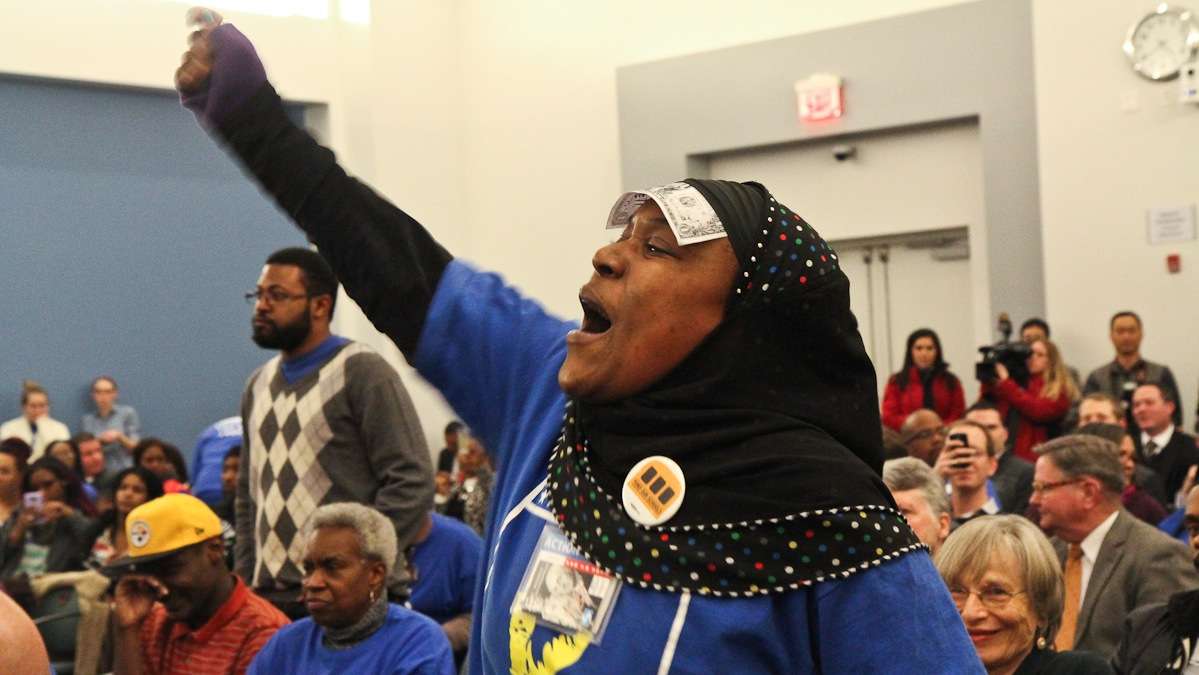
Tyesha Anderson protests charter expansion at a contentious 2015 School Reform Commission meeting. (Kimberly Paynter/WHYY)
-

After hundreds of hours of hearings on an “unprecedented” 39 applications, the School Reform Commission voted to conditionally grant five new school charters in Philadelphia last night. It denied the 34 remaining applicants.
Even so, protesters upset that any new charters were approved disrupted the meeting. Police arrested four people who ignored please to disperse so the votes could continue.
The new charters — Independence Charter West, KIPP DuBois, MaST Community Charter/Roosevelt, Mastery Gillespie and TECH Freire — all represent known entities with track records in the city. Each would have to set up shop in or serve neighborhoods deemed a priority by the school district.
The conditions requested by the district’s Charter Schools Office also pared back the new schools and tightened the timeline for each to get results. The new schools would be re-evaluated in three years, not the usual five.
The vote came at the end of nearly four hours of public and applicant comment. At the start of the meeting, a line of people trying to gain admission to the room spilled down the steps of 440 N. Broad Street and out to the sidewalk.
Inside, the start of the meeting was interrupted by members of Youth United for Change, a student-led activist group, shouting slogans like “No education! No life!”
During the applicant and public comment, many parents of charter school students came to the mic to speak about their experiences in those schools, both positive and negative.
In particular, KIPP used its alloted to have existing KIPP parents and students plead for more seats.
“Being on the wait list is the worst experience in the world because you’re not in control of your future,” said KIPP student Danielle Freeman. She said going to KIPP helped her break a cycle of poor school performance and suspensions.
After the vote, CEO Marc Mannella said he was disappointed KIPP didn’t get more seats for students like Freeman. “I think that tonight was kind of a sad night. I think there was missed opportunity to really make a difference in the lives of a whole ot of kids.”
Superintendent William Hite didn’t share Mannella’s sentiment.
“It’s easy to think about this when it doesn’t negatively impact other children that are served in your school. But if this is taking resources away from all other children, that is a concern,” said Hite.
Parent Molly Michel, also testified passionately.
“I found Southwark [Elementary] remarkable, because I had been conditioned to believe that public schools were not good enough,” said Michel. She had originally enrolled her daughter in a charter school but switched to Southwark after visiting. “The school is thriving,” said Michel.
She added that her daughter is now learning to read in two languages in Southwark’s bilingual immersion program.
But the crowd saved some of its of the loudest cheers were for Helen Gym, co-founder of Parents United for Public Education and candidate for city council who said approving any new charters would be “not only morally repugnant but economically insane” due to the cost of new charters to the district. Philadephia schools have an $80 million hole in their budget going into the next academic year.
Financial impact uncertain, but “very limited”
While the actual dollar figures for how much the new schools will cost the district are forthcoming, SRC Chairman Bill Green insisted money was not a factor in the decision to approve or deny any of the 39 pplications.
Green also said the new charters would not affect the overall budget for next year.
Only one school, KIPP DuBois, was approved to open in the fall. The number of seats approved for that charter is roughly equal to how much KIPP is over-enrolled at another school, said Green. The new school would take on those students, effectively making its first year cost-neutral.
The impact in coming years “will be very limited” said Green, who believes the district’s on-going efforts to shut down poorly-performing charters will help balance out costs.
All in all, the SRC approved 2,684 new charter seats. The district did not hazard a dollar figure associated with creating this many seats but said it would release that number later in the week. Mid-year charter school closings displaced around 1,100 students this year — putting most back into District schools.
Much debate focused on whether the SRC had to approve new charters and whether cost could be considered as a factor. In the days leading up to the meeting, Chairman Green was quoted as saying under the SRC must approve charters that meet the criteria of the state’s charter school law.
According to David Lapp, lawyer with the Education Law Center, there is no legal precedent for a school district that is declared “fiscally distressed” having to create new charters that would negatively impact existing schools.
In a post-meeting discussion with reporters, Green stated that the commission’s official “adjudications will speak for themselves.” He said by law the SRC could not consider the district’s financial situation as a part of it’s decision.
Marjorie Neff, former principal of Julia R. Masterman School and the only commission member not to cast a single vote in favor of a charter applicant, also said she didn’t vote with money in mind. The district’s budget deficit was “not caused by charter schools,” said Neff. She she said she sided against all of the applications because, to her mind, they did not fulfill the criteria to approve under the law.
As for the $35 million grant proposed by the Philadelphia School Partnership two weeks ago, Green said that after the public offer, “we didn’t engage in discussions with them.” PSP said $25 million would be to offset the costs involved of adding more charter seats, $10 million to help traditional district schools. But Green said he expects PSP to reach out to Superintendent William Hite about the offer in the near future.
Any discussion of that grant, said Green, will have the “district’s overall priorities…front and center.”
Looking ahead
The five approved charter applicants have until May 31st to meet with the district “to agree on conditions that are mutually acceptable,” said Green.
For each school, the district had conditions related either to enrollment priorities or catchement areas. In the case of MaST, the district requested a location change to the eastern section of North Philadelphia. “We had looked at some other locations…so, you know, we’ll figure it out,” said CEO of MaST John Swoyer.
The district also cut the enrollment figures of the conditionally-approved schools, but Swoyer said in spite of serving fewer students he was still “excited and ecstatic.”
Green said that he hopes to speed up the charter closure process under the SRC’s proposed Authorizing Quality Initiative. He said that should make it easier to evaluate new charters after just three years.
“Our policy is to renew more charters on an annual basis and not wait for the five year period to wait for performance issue,” said Green.
Rejected charter applicants still have one option: the Charter Appeals Board. If they can rustle up the support — and 1,000 signatures — within 60 days applicants may present these to the Court of Common Pleas. The court then decides whether to send their case up to the appeals board.
Some applicants, like Girls Latins David Hardy, are already eyeing that process. “Title IX. We got Boys Latin, we need Girls Latin,” said Hardy, referring to the federal mandate for gender equality in schools.
Even some of the approved applicants expressed interest in appealing their other, denied, applications.
“I’m not sure how one of three could be approved for us,” said CEO of KIPP, Marc Mannella. His group submitted three applications with essentially the same plan, so how only one could be approved “based on merit” did not make sense, he said. Appealing is “certainly an option.”
The Charter Appeals Board consists of seven appointees from both sides of the political aisle and Pedro Rivera, Governor Tom Wolf’s Secretary of Education, now chairs the body.
In a release following the SRC decision, Wolf’s press team said: “The Wolf Administration continues to believe that the district’s financial situation cannot responsibly handle the approval of new charter schools.”
In the days leading up to the decision, Green and the SRC received letters from several pro-charter Republicans urging them to green light new charters. Green said “there was no strategy” in approving new charters based on that pressure.
Some of the meetings’ commenters stressed that no decision would satisfy the drive for more charters from legislators.
“You cannot please and you cannot appease Harrisburg,” said Susan Gobreski, Executive Director of Education Voters of Pennsylvania.
Below is a scorecard of how each commissioner voted on the 39 charter applicants.
| ACES Business and Entrepreneurship | Deny | Deny | Deny | Deny | Deny |
| American Paradigm Oxford Circle | Deny | Deny | Deny | Deny | Deny |
| American Paradigm Port Richmond | Grant | Deny | Deny | Deny | Deny |
| ASPIRA Ramon E. Betances | Deny | Deny | Deny | Deny | Deny |
| Belmont Charter High School | Grant | Deny | Grant | Deny | Deny |
| Congreso Academy | Deny | Deny | Grant | Deny | Grant |
| Esperanza Elementary | Deny | Deny | Grant | Deny | Deny |
| Franklin Towne Middle School | Deny | Deny | Deny | Deny | Deny |
| Friendship Philadelphia | Deny | Deny | Deny | Deny | Deny |
| Germantown Community Academy | Deny | Deny | Deny | Deny | Grant |
| Girls’ Latin of Philadelphia | Deny | Deny | Abstain | Deny | Deny |
| Global Leadership International | Abstain | Deny | Abstain | Deny | Deny |
| Green Woods Overbrook Farms | Deny | Deny | Grant | Deny | Deny |
| Independence Charter High | Deny | Deny | Abstain | Deny | Deny |
| Independence Charter West | Grant | Grant | Abstain | Deny | Grant |
| Innovative Dimensions STEAM Academy | Deny | Deny | Deny | Deny | Grant |
| Keystone Prep | Deny | Deny | Deny | Deny | Deny |
| KIPP Dubois | Grant | Grant | Abstain | Deny | Grant |
| KIPP North Philadelphia | Deny | Deny | Abstain | Deny | Deny |
| KIPP West Philadelphia | Deny | Deny | Abstain | Deny | Deny |
| Leon H. Sullivan Opportunities | Deny | Deny | Deny | Deny | Deny |
| Liguori Academy | Deny | Deny | Deny | Deny | Deny |
| MaST Roosevelt | Grant | Grant | Grant | Deny | Grant |
| Mastery Gillespie | Grant | Grant | Abstain | Deny | Grant |
| Mastery North Philadelphia | Deny | Deny | Abstain | Deny | Deany |
| New Foundations Brewerytown | Deny | Deny | Deny | Deny | Deny |
| PHASE 4 America | Deny | Deny | Deny | Deny | Deny |
| Philadelphia Career and Technical | Deny | Deny | Deny | Deny | Deny |
| Philadelphia Music and Dance | Deny | Deny | Deny | Deny | Deny |
| PHMC Preparatory Charter | Deny | Grant | Deny | Deny | Abstain |
| String Theory – East Falls | Abstain | Deny | Deny | Deny | Deny |
| String Theory – Greys Ferry | Abstain | Deny | Deny | Deny | Deny |
| String Theory – Port Richmond | Abstain | Deny | Deny | Deny | Deny |
| String Theory – Southeast | Abstain | Deny | Deny | Deny | Deny |
| Sustainable Roots | Deny | Deny | Deny | Deny | Deny |
| TECH Freire | Grant | Grant | Grant | Deny | Deny |
| The Partnership School for Science and Innovation (MaST) | Deny | Deny | Grant | Deny | Deny |
| The Pavilion School for Exceptional Students | Deny | Deny | Deny | Deny | Deny |
| Urban STEM Academy | Deny | Deny | Deny | Deny | Deny |
The Public School Notebook contributed reporting for this piece.
WHYY is your source for fact-based, in-depth journalism and information. As a nonprofit organization, we rely on financial support from readers like you. Please give today.


